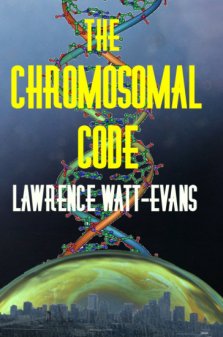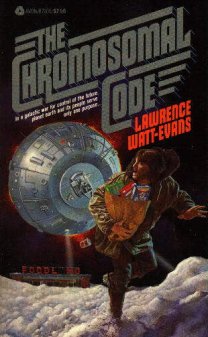A Science Fiction Novel by Lawrence Watt-Evans
Misenchanted Press edition |
|---|
|
|
First published by Avon Books |
The Chromosomal Code is set during a new ice age; it opens with John Starkman looting a long-abandoned supermarket in western Pennsylvania, and being interrupted by the arrival of a starship.
Help has come -- or has it?
Origins | Excerpt | History | Exits
Where the story came from:
In 1976 I was living in Pittsburgh with my fiancée, who was double-majoring in chemistry and biology at Carnegie-Mellon University. She was doing what was then pretty advanced research in genetics, mapping highly-repetitive cow DNA -- twenty years later our kids were doing this sort of stuff in high school bio classes, but in 1976 it was cutting-edge.
I was fascinated to learn that there was apparently such a thing as "junk" DNA, and immediately began thinking about how one might use it in a science fiction story.
To me, using it to hide messages seemed the obvious choice -- but what message, and who hid it?
Also, while it may seem hard to believe now, in the late 1970s virtually nobody was worried about global warming yet; in fact, there was a rash of harsh winters, 1978 being the most spectacular in my part of the world, and a few people speculated about a new ice age.
I added that to the mix, combining it with memories of a day in 1971 when my part-time job bagging groceries at a local supermarket was snowed out, but no one bothered to officially tell me, so I showed up for work, even though I knew it was silly, and even though it meant plowing through ten-foot snowdrifts in the parking lot. I found myself completely alone in the deserted, snowed-in, not-yet-plowed strip mall, staring into the dark interior of the store, imagining various post-apocalyptic scenarios.
I had been designing aliens since I was a kid, so I threw some of them in, as well.
And then I just needed to find time to write it, and a publisher.
Up until then all my novels were published by Del Rey, but Judy-Lynn del Rey's reaction to this one when it was finished was, "It's a perfectly good novel, but it's not right for our line." This was what prompted me to get an agent; up until then I'd done fine without one. Or so I thought, anyway; I later learned I'd signed away a few things I shouldn't have, but I got them back eventually.
Anyway, my new agent, Russ Galen, who has represented me ever since, took the novel to Avon, where they were trying to revamp their SF line. They bought it and published it, and all was well.
Origins | Excerpt | History | Exits
The Chromosomal Code
by Lawrence Watt-Evans
Chapter One
The landscape was white and gray and black, with no trace of color. The sky was the dull, dead, dirty off-white of winter on this June day; the ground was hidden beneath the pale white sheen of clean snow. The building ahead of him, what little of it showed, was the rough white of painted concrete, picked out with the gray and black of shadows. Black shadows also served to mark the pine trees that edged the open area that had once been a parking lot; the dull green of their remaining needles was lost in the sodden masses of snow that weighed them down.
The building's facade was largely hidden in a long strip of shadow where the overhang failed to meet the snowdrifts, a strip perhaps fifteen meters long and one meter high, divided into segments by the peeling white-painted, unornamented pillars. At one point to the right of center the lower edge of the gap dipped down, the sharp white edge of the drifts broken through. His dirty brown coat the only color in sight, John Starkman was headed toward this break in the wall of snow.
The footsteps he followed through the drifts were his own, layered on top of one another but all of his own making, the only break in the smooth surface of the snow and the only trace of human presence. He had discovered the building a month or so ago, astonishingly, miraculously intact, and had made the long trek out to it half a dozen times. It was such a rich find that he had seriously considered moving from his long-established home to somewhere nearer at hand.
On a day like this, however, he didn't mind the walk. Enjoying the unaccustomed June warmth, with temperatures as high as three or even five degrees above freezing, Starkman had the fur-lined hood of his coat flung back; the gentle breeze, so unlike the freezing gales of winter, kept his untidy hair clear of his eyes. There was little glare under the leaden, overcast sky, and no chance that he could imagine of encountering another human, so he had left his sunglasses in his pocket.
He reached the base of the final barrier of snow and clambered up the drift, his feet packing down the powder that had blown into his path since his last visit. For a moment he was reminded of his New England childhood, when climbing drifts had been something he did for fun, rather than out of necessity.
He half climbed and half slid his way down the other side, catching himself upright again on the narrow strip of sidewalk left bare by the encroaching snow. Before him in the shadowed dimness was the man-sized hole he had broken in the glass front of the little sipermarket; the only trace of snow beyond the glass floated in a puddle of dirty water just below the opening, where it had either been blown by a freak of wind or been tracked in on Starkman's boots. He reminded himself that he would have to clear that puddle away somehow if he was to avoid having an inconvenient patch of ice when the warm spell ended. He stepped carefully through the hole and strode past the checkouts into the darkness of the deserted aisles, aisles that were still stacked high with unlooted merchandise. The sound of his bootheels on tile turned sharp and clear as the slush and snow fell away.
He marveled anew that even here, so far from the city, no desperate fleeing party or lingering scavenger before him had come across the place and stripped it clean. It was well off the main roads south, and in an area where the neighbors would have been rich enough to leave early, before looting became common, but it was still surprising.
He found what he wanted and emerged into the dim light at the front of the store with a bottle of Coke in hand. He seated himself comfortably on one of the checkout counters and reached down beside the cash register to retrieve the bottle opener he kept stashed there. When the cap was pried off the bottle fizzed gratifyingly, which he considered a fairly reliable sign that the stuff was still safe to drink. He looked at it critically, noting that there was only a slight trace of ice, then took a long pull at the bottle before resting it once more on his knee and gazing out the broken window at the barrier of snow beyond.
It was his custom to take a rest like this before getting down to the serious business of gathering supplies and carrying them back home; the cola was a regular part of it, since the journey always made him thirsty and a little weary. He was convinced that the sugar helped provide the energy necessary for the return trip.
Sometimes, if there was sufficient light, he would read the paperbacks and the browning tabloids that were ranged around each checkout, challenging himself to identify each of the celebrities the scandal sheets mentioned. On this occasion he just sat, staring out at the snow and taking a swig from the bottle every few seconds, admiring the plate-glass frontage. Except for the entry hole he had made himself it was still completely sound, as thought the supermarket might open for business at any moment. Faded signs advertising specias on chicken and lettuce still clung to the glass, while others had fallen to the floor in mild disarray. One poster neatly covered the glass he had swept aside after breaking his entrance. The fluorescent lights, both in the store and under the overhang out front, were unbroken, as if the flip of a switch could bring them to life as it had long ago.
The drifts beyond were not more than three meters high at the very most, probably closer to two and a half, and easily a dozen centimeters lower than on his last visit. He wondered how long the good weather would last, and whether he might see bare ground without having to dig for it. That hadn't happened for ten years.
Such a complete thaw seemed unlikely. Probably, he told himself, the warm spell would pass, and the summer would be neither better nor worse than those that had preceded it.
He took another long pull on the bottle, then put it down. The puddle under the window caught his attention, and he tried to remember which aisle held buckets and mops and sponges.
Something moved at the edge of his vision; he started and looked up.
Something was moving out there, in the area of sky visible between the snowdrifts and the overhang, a dot against the gray-white overcast. His eyes widened from their customary snow-blind squint.
He tried to tell himself that the dark speck was a bird, some damn fool of a bird that had found its way north again, but the thing was not moving like a bird, with swoops and flutters or riding the breeze. Instead it moved steadily and slowly through the air, along a dead-straight course. It glinted dully despite the clouds.
Click here to return to the top of the page 
Origins | Excerpt | History | Exits
Publication History
Copyright 1984 by Lawrence Watt-Evans
First edition published by Avon Books in May 1984, ISBN 0-380-87205-6. Cover art by Carl Lundgren
Second edition published by Misenchanted Press in November 2012, ISBN 978-1619910041. Cover design by the author

Click here to return to the top of the page 




